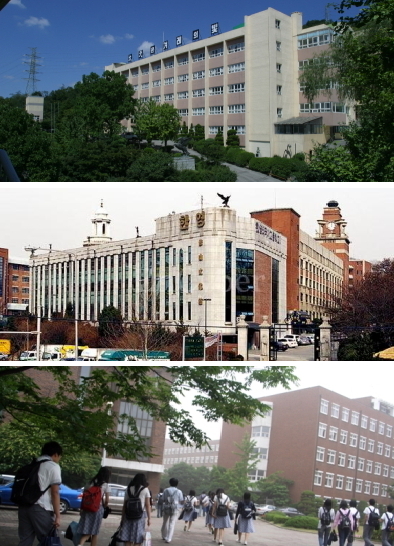
A handful of elite high schools here produced more than 10 percent of the country’s judges, a new report showed Monday.
Of 1,959 judges appointed from 2003-2013, about 11 percent or 227 judges were educated from five foreign language high schools in Seoul, according to Supreme Court data released by Rep. Kim Jin-tae of the Saenuri Party.
Daewon Foreign Language High School in Gwangjin-gu produced by far the largest number of judges, with 97 graduates currently authorized for the court.
Hanyoung Foreign Language High school in Gangdong-gu was the second-biggest producer of judges with 46 judges, followed by Myungduck Foreign Language High school with 42.
Daeil and Ewha Girl’s Foreign Language High school also produced 24 and 18 judges respectively during the period.
The report came amid growing criticism that the special-purpose private schools have contributed significantly to rising private education costs and unnecessary competition among students.
The report also showed that a degree from Seoul National University is also vital for the legal professions, with more than half of the judges (53.45 percent) graduating from the prestigious school.
Haksung High School located in Ulsan is the only public school that made it into the top five producers of judges with 27, according to the report, while Kyunggi High School and Kyungbock High School, which used to be known as gateways to the legal profession, educated only 11 and 10 judges respectively over the past decade.
The purpose of the foreign language high schools is to nurture talents in foreign language studies. However, their curriculums have become more standardized, focusing on university entrance exam subjects, critics say.
Other reports also showed that 1 in 3 high-flyers in the diplomatic service are foreign language high school graduates ― Daewon, in particular, educated 34 out of 269 diplomats, who passed the state-foreign service examination from 2003-2012.
Rep. Kim pointed out that the top elite high school’s admission systems contributed the monopoly of the country’s legal profession.
Currently, the schools select students among qualified applicants by their middle school grades unlike other public schools that select all students by lottery.
“The schools can select high-performing students, and they go to prestigious universities and (successfully) land in the legal profession,” he added.
By Oh Kyu-wook (596story@heraldcorp.com)
Of 1,959 judges appointed from 2003-2013, about 11 percent or 227 judges were educated from five foreign language high schools in Seoul, according to Supreme Court data released by Rep. Kim Jin-tae of the Saenuri Party.
Daewon Foreign Language High School in Gwangjin-gu produced by far the largest number of judges, with 97 graduates currently authorized for the court.
Hanyoung Foreign Language High school in Gangdong-gu was the second-biggest producer of judges with 46 judges, followed by Myungduck Foreign Language High school with 42.
Daeil and Ewha Girl’s Foreign Language High school also produced 24 and 18 judges respectively during the period.
The report came amid growing criticism that the special-purpose private schools have contributed significantly to rising private education costs and unnecessary competition among students.
The report also showed that a degree from Seoul National University is also vital for the legal professions, with more than half of the judges (53.45 percent) graduating from the prestigious school.
Haksung High School located in Ulsan is the only public school that made it into the top five producers of judges with 27, according to the report, while Kyunggi High School and Kyungbock High School, which used to be known as gateways to the legal profession, educated only 11 and 10 judges respectively over the past decade.
The purpose of the foreign language high schools is to nurture talents in foreign language studies. However, their curriculums have become more standardized, focusing on university entrance exam subjects, critics say.
Other reports also showed that 1 in 3 high-flyers in the diplomatic service are foreign language high school graduates ― Daewon, in particular, educated 34 out of 269 diplomats, who passed the state-foreign service examination from 2003-2012.
Rep. Kim pointed out that the top elite high school’s admission systems contributed the monopoly of the country’s legal profession.
Currently, the schools select students among qualified applicants by their middle school grades unlike other public schools that select all students by lottery.
“The schools can select high-performing students, and they go to prestigious universities and (successfully) land in the legal profession,” he added.
By Oh Kyu-wook (596story@heraldcorp.com)
-
Articles by Korea Herald












![[Today’s K-pop] BTS pop-up event to come to Seoul](http://res.heraldm.com/phpwas/restmb_idxmake.php?idx=644&simg=/content/image/2024/04/17/20240417050734_0.jpg&u=)





![[KH Explains] Hyundai's full hybrid edge to pay off amid slow transition to pure EVs](http://res.heraldm.com/phpwas/restmb_idxmake.php?idx=652&simg=/content/image/2024/04/18/20240418050645_0.jpg&u=20240419100350)

![[Today’s K-pop] Zico drops snippet of collaboration with Jennie](http://res.heraldm.com/phpwas/restmb_idxmake.php?idx=642&simg=/content/image/2024/04/18/20240418050702_0.jpg&u=)